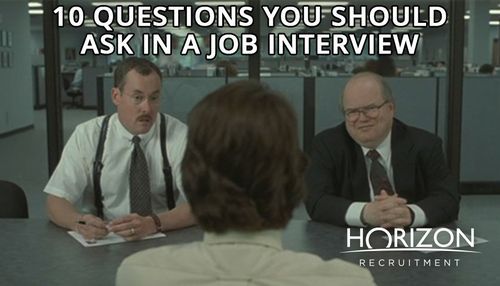Jason Saliani • April 22, 2016

Here you are, the moment you’ve been waiting for. You’ve wowed them throughout the interview with standout answers and then the interviewers turn the tables and ask ‘do you have any questions for them?’ Oh yes, you definitely do!
You know what questions not to ask (because you read our last article...here) and you know that this is your chance to gain valuable insight on the company, the culture and your potential new role while demonstrating interest and all around awesomeness.
Here is some inspiration to help you get one step closer to your dream job. Of course, you aren’t going to have the time to ask every single one of these, but pick and choose depending on what’s been covered off already and what is most important to you!
1. What are some challenges I might face in this role?
You aren’t one to back down from a challenge, in fact you thrive on them and this question shows that. Bonus – Remember their answers, because if there’s an opportunity in a later interview to demonstrate how your experiences and skills can overcome these challenges – do it!

2. What does success look like in this role?
Showing that you care about success and are interested in knowing how your managers define success will set you up to knock their expectations out of the park.
3. What does a typical day of work look like?
Knowing what the normal day-to-day looks like will help you gauge how you’ll be spending a big chunk of your work life. If you are going to be spending 40+ hours a week doing something, shouldn’t you know what it will really be like? Do you have the opportunity to get involved in additional projects? How much work is done in a team versus individually? All good things to know if you want to love your job.
4. Is there opportunity for growth or advancement within the company?
It’s definitely nice to know if a company has a culture of promoting from within or if they typically hire externally when there’s an opening. Asking about potential progression is also good sign to your hiring manager that you are ambitious and care about your career and your future.

5. What makes a good fit culturally here?
This is another way of asking what the team is like. Since you’ll (hopefully!) be spending a lot of time with these people, you’ll want to know what they are like, how social they are, and if you’d be a good fit. Knowing if the team is looking for someone who can hold their own in a ‘karaoke off’ (I’ve actually had a client tell me this was a must) goes a long way to help you figure out how you’ll like the dynamic and if it’s the right fit for you.
6. What are your expectations for this role during the first 30 days, six months, a year?
Knowing what the expectations are in the distant and not-so-distant future will help you stay on track and also see how this position might grow in the future. Do you need to accomplish something specific before taking on an exciting major project? This type of question helps you understand what they will need to see from you so that they see you as a star.
7. Where is the company heading in the next five years?
Are you looking to dial up your career to the next level with a fast growing start up? Or are you looking for something a little more stable? Where the company is headed in the next 5 years should align with what you’re looking for in this move. Keep in mind that an overzealous vision can sometimes be a red flag, but optimism and positivity for the success of the company should always be there.

8. What are the next steps in the interview process?
This is a fairly simple question to get a gauge of what the process as a whole will look like. This can also provide some insights on how far along you are and how many other candidates are also still in the running. It also shows that you are interested in what’s next.
9. What do you think are the most important qualities for someone to succeed in this role?
You know when they ask you what qualities make you the best fit for the role? Well, this is your turn to see what their thoughts are on the same subject. Again, remembering these will help in future interviews if you can demonstrate these qualities. It can also help you dial up these qualities both in the interview and while on the job to ensure success
10. What excites you about working here?
This might be my favorite question. When you can see the twinkle in the interviewers’ eye when they tell you why they love the company and what excites them, there’s nothing more telling. When there’s excitement to be a part of future plans, then you know there’s passion. Genuine excitement and passion for a company translate to happy employees, and businesses with happy employees outperform the competition by 20 per cent. And it feels good to be part of a successful company, doesn’t it!?
Remember to use this time to your advantage. Your questions should help you gather valuable insights on the company and their culture and also demonstrate your interest in the role at hand. You will see that none of the examples are salary, benefits, vacation or other policy driven questions – leave those for later. Take this opportunity to dive into the deeper, more value driven questions and you’ll be on the right track!
If you haven’t read it yet, be sure to check out our list of 10 Questions To NOT Ask In A Job Interview.
Share Blog
Latest Blogs



